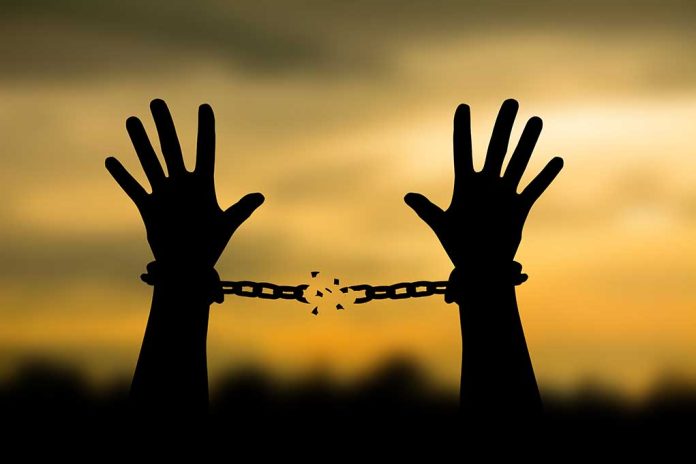
New Jersey Governor Philip D. Murphy pardons three women convicted of murder, highlighting a shift towards criminal justice reform and recognition of domestic abuse victims.
At a Glance
- Gov. Murphy commuted sentences of three women convicted of killing abusive boyfriends
- These are Murphy’s first pardons in his two-term administration
- A clemency advisory panel was established to review cases
- The move is part of a broader focus on addressing inequities in the criminal justice system
- 33 individuals received pardons in total
Governor Murphy’s Unprecedented Move
New Jersey Governor Philip D. Murphy has taken a significant step in criminal justice reform by pardoning three women convicted of murder. These pardons mark the first use of his clemency powers since taking office in 2018. The women, Myrna Diaz, Dawn Jackson, and Denise Staples, were all victims of domestic abuse and had been convicted of killing their boyfriends. Their release, expected by Wednesday, underscores a growing awareness of the impact of domestic violence on criminal cases.
A New Approach to Clemency
Murphy’s administration has prioritized addressing inequities in the criminal justice system. Six months ago, a clemency advisory panel was established to review cases deserving of pardons or commutations. This panel focuses on nonviolent offenders and those who were victims of domestic or sexual violence. The governor described this as “the most momentous day” of his tenure, promising more similar actions in the future.
“This is about the most momentous day I’ve had as governor” – Mr. Murphy
Unlike his predecessors, Murphy did not grant pardons until late in his second term. This delay allowed for the establishment of a more structured approach to clemency decisions. Justin Dews, chairman of the advisory board, emphasized the importance of fairness in these decisions and expressed hope that future governors would continue this approach.
🇺🇸NEW JERSEY GOVERNOR PHIL MURPHY ISSUES FIRST PARDONS AFTER 7 YEARS
Murphy granted 33 pardons and 3 sentence commutations in his first act of clemency, nearly seven years into his term.
Most pardons addressed non-violent crimes like drug offenses and property crimes, while… pic.twitter.com/dplyCtZ7gY
— Mario Nawfal (@MarioNawfal) December 17, 2024
Broader Impact on Criminal Justice Reform
Murphy’s actions are part of a larger trend among Democratic governors using clemency to address specific groups of offenders. Similar initiatives have been seen in Oregon, Massachusetts, and Maryland, particularly regarding marijuana-related offenses. In New Jersey, the legalization of cannabis has allowed for the expungement of certain marijuana-related criminal records.
“As we approach the final year of our administration, we will continue embracing a fair, impartial and balanced approach for granting legal relief to New Jerseyans who have earned a second chance” – the governor
The ACLU of New Jersey has supported this approach to clemency, seeing it as a way to address systemic injustice. The organization represented the three women whose sentences were commuted, highlighting their long histories of trauma and abuse. These commutations are viewed as steps to correct past injustices in the legal system.
Phil Murphy pardons 33 and commutes sentences of 3 others incarcerated in NJ https://t.co/8WqiJIA9cS
— NorthJersey.com (@northjersey) December 16, 2024
Public Response and Future Implications
The pardons have garnered attention from various quarters. Kim Kardashian, who supported Dawn Jackson’s case, praised Murphy for choosing “redemption over condemnation.” This high-profile support underscores the growing public awareness of the complexities surrounding domestic violence and criminal justice.
“I think we’re a much more – thank God I might add – survivor-centric society.” – Gov. Phil Murphy
As Murphy’s second term progresses towards its end in January 2026, these clemency actions set a precedent for future administrations. The governor’s commitment to addressing past injustices and promoting second chances may influence criminal justice policies beyond his tenure, potentially reshaping New Jersey’s approach to rehabilitation and reintegration of offenders.
Sources:
- Gov. Murphy Grants First Pardons, Freeing 3 Women Convicted of Murder
- Gov. Murphy pardons 33 and commutes 3 women’s sentences in first use of clemency
- Gov. Murphy Grants First Pardons, Freeing 3 Women Convicted of Murder






